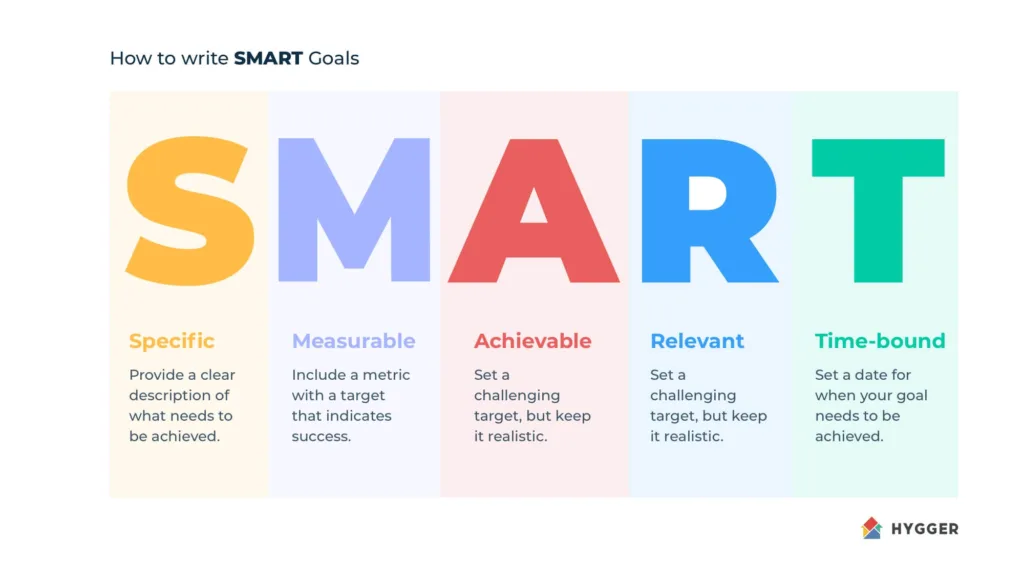There’s a good chance no one taught you how to set long term career goals. Most high school and college curriculums will teach concepts and theories on varying subjects, but “How to Get Ahead in Your Career 101” was probably not on the course listing. Learning how to set and achieve long term career goals usually happens in one of three ways:
- You learn the hard way through trial and error
- A career mentor helps you navigate setting and achieving long term career goals
- You read a very informative blog post that gets you started
Each of these is probably a good way to learn how to set long term career goals, but we’ll hazard a guess that your desire to get promotions, salary increases, and secure a strong financial retirement for yourself is something you’d like to achieve sooner rather than later and with in as painfree a way as possible. That being said, taking those steps in reverse is the best career development strategy.
👉 Hot Tip: Check here for more mentoring resources and tips. You’ll find excellent guides, posts, and ebooks that can help you learn how to be a better mentor, a more effective mentee, or how to create mentoring programs at work.
To get started setting long term career goals and actually achieving them, the best approach is to do the following:
- Read best-practice advice (that’s why you’re here!)
- Get a career mentor to help guide you
- Put your plans into practice and refine your process as you go
This article will outline to you the important things you need to know when setting your career goals and why goal setting is something you must do in the first place.
Long Term Career Goals – What Are They?
Long term goals are any important milestones that you set out to achieve in the long term, not in the immediate time period. These goals help align your activities now to ensure that everything you do contributes toward that goal. They’re also intrinsically motivating, meaning that just the process of setting goals makes them more likely that you’ll achieve them.

The goals you set also serve as a blueprint so you know how to maximize your time and resources if you want to see those goals accomplished.
- Reminders. When you are distracted or you shift your focus to something else, the long term goal will remind you to get back on track. It is essentially what maps out the career trajectory and gives you a long term vision until you have reached that goal.
- Skill development. Identifying your long term career goals is important because it helps you determine what skills and experience you need to achieve them. Along the way, you will master the skills you need to be able to accomplish your goals. You will also be gaining experience through your existing career to prepare you for that goal you set for yourself.
- Motivation. Long term goal setting serves as your personal motivator so that you can continue to aspire for personal development and professional development. In fact, you are 42% more likely to achieve goals if you write them down. You need these two components if you want to achieve your long term and short term career goals.
About the Goal Setting Theory
The Goal Setting Theory by Dr. Edwin Locke was established after years of research in the 1960s. This theory states that employees who received clearer goals and feedback on those goals proved to be more motivated and successful in their work.
The theory also pointed out that providing more specific and realistic goals led to an increased desire to achieve those goals, no matter how challenging those career goals are.
Dr. Edwin Locke later on partnered with Dr. Gary Latham on a work called A Theory on Goal Setting and Task Performance that outlined the best practices for goal setting in the workplace. It’s a helpful guide for building and achieving long term career goals and how to use that as a tool actualizing your professional aspirations within the work environment.
The Importance of Setting Long Term Career Goals
Why is it important to set long term career goals?
- Setting goals serves as a foundation for building your professional life and career.
- Goal development is crucial if you have personal aspirations because you need your professional success to have the means of achieving them.
Below are some of the reasons why you need to set long term professional and personal goals, and how they can impact your career development.
1. Motivation

The primary reason for goal setting is to achieve personal motivation. Goals give you something to aim for whereas a lack of them can result in a lack of organization about what you should and should not do.
But that’s not all. Setting and achieving your long term goal can motivate you further once you have achieved them. It creates a series of events that trigger your desire to become and do better while you achieve your own goals.
As a reminder, motivation can be both internal or external. Personal goal setting is offers internal motivation as you’re driven to succeed with those goals. However, if you find your internal motivation waning, getting a workplace mentor will help boost your external motivation as you’ll have someone to cheer you on and guide you in the right direction.
2. Self-Improvement
Setting long term goals help you to find ways of improving yourself, personally and professionally. You will be motivated and inspired to learn new hard and soft skills, gain leadership experience, and acquire all the necessary tools to get to the next level in your career development.
3. Personal and Professional Growth
It is part of the natural human instinct to aspire to grow. Therefore, setting long term goals for your career will help you achieve that desire for growth. It opens your eyes to new opportunities to adapt to new skills and gain leadership experience.
Does your current employer offer you the type of career development you need? If not, you’re probably thinking of quitting for one that does. A LinkedIn study found that 94% of workers stick around at their current employer longer when career and skill development opportunities are offered.
Once you work towards your professional and personal goals, you can relish in your accomplishments. It also makes you understand the value of working towards your goals as part of your career development.
4. Direction
Breaking up your long-term goals into achievable chunks will make it far easier to accomplish them. One strategy for that is to turn the long term goal steps into bite-sized short term goals.
A short term goal is important because it gives you a shorter time frame to work with and gives instant gratification. Long term goals are useful, but if you don’t separate them into more easily achievable tasks, those goals can start to feel overwhelming.
Tips for Setting a Long Term Career Goal
Now that you understand what long term career goals are for, the next step is to know how to set those goals. The following are important guidelines you can use to achieve success in goal setting and advance your career goals.
1. Use the SMART goal framework
The SMART framework is an established method for developing your long term goals. SMART standards for:
- Specific – Make your goals as clear as possible.
- Measurable – It should be easy to measure the success of your goals.
- Attainable – Make sure to set realistic goals that you have the essential skills and tools to achieve.
- Relevant – It should be aligned with your current position, career path, or your long term vision to change careers.
- Timely – It should have a set timeline for when you expect to achieve a particular goal.

Based on the framework above, you should be able to quantify your goals and identify the specific steps needed to get there.
2. Find a mentor
If you’re not sure about your direction of your career, you can work with a mentor or career coach. They can help give you valuable career advice so you can identify the correct career paths to pursue based on your passion or skills.
A career coach can also help organize your long term career goals to ensure they are within the framework outlined above. Find yourself a thought leader that will lend insight into your decision-making process.
3. Reflect on some questions
To make sure that you have set the right goals for your career, you can delve deeper into your goals with these questions:
- What are my expected results from this goal?
- Do I have the essential skills to make it happen?
- Is the timeframe for my goal realistic?
- What will happen to my career after I achieve this goal?
These questions will help you map out the steps needed to achieve your goal and advance your career, whether in your current or in a new industry.
Long Term Career Goals Examples
Are you at a unique point in your career where you don’t know where you want to go next? Instead of mentally checking out or “quiet quitting” until the next opportunity comes around, consider changing and investing in your goals.
The following are some examples of long term career goals that should inspire you or give you ideas on where you want to take your career path next.
1. Gain Leadership Experience
If you want to assume a leadership position, it is imperative that you start with this goal: gain leadership experience. Experience is just as important as leadership skills if you have a long term career goal of taking on a leadership role.

Obviously, you can’t just gain leadership experience without someone actively handing you the reigns to a leadership role. With that in mind, try some of the following:
- Be bold and ask to lead projects
- Bring project ideas to your manager and ask to lead those projects
- If leadership roles become available, submit your name as a potential candidate
- Work diligently with your career mentor, who can become a sponsor and advocate for your desire to take on leadership roles
You can enroll in a mentorship program with a thought leader in your industry or work under a senior executive to gain the experience you need for a promotion. Taking these steps will provide you with the necessary qualifications to take on the leadership role.
2. Career Change
Making a career change can be a scary thing. However, if you feel that you have no room for personal and professional growth in your current company or position, it makes sense to switch to a new industry. Far too often, this is one of the best ways to get ahead.
Pew Research discovered that job switchers see a 10% increase in their pay, on average. That’s far more than the average annual pay increase for someone who stays put at their employer. Job switchers are also more likely to be able to move into open leadership positions, as well.
It is not uncommon for many people to consider switching careers if they were forced to settle into their current job because of financial reasons or availability. However, some people do not flourish in their roles because it is not challenging enough, there are little to no career advancement opportunities, no company-sponsored development programs, and only paltry pay increases.
Therefore, changing career paths will help you achieve better fulfillment in your career, especially if you land your dream job.
3. Expanding Your Professional Network

Your professional connections play a vital role in your career strategy. Having a robust network of professional connections allow you to meet new people that could open up new doors of opportunities. For example, connecting with someone who owns a major company could hire you for a job description that fits your skills and expertise.
Finding the opportunities to make those networking connections can be hard. Participating in a mentoring group or mentoring circles is one way. And if your organization offers reverse mentoring programs, you may want to volunteer to be a mentor to a senior leader and build important networking connections that way.
It is important to spend time networking and building connections if you want to flourish in your career. The more you expand your network, the more you have access to potential resources and opportunities for career growth.
4. Be a Thought Leader
A thought leader is someone who is considered an expert in your industry or field. To get to this status, it takes years of practice and experience in the field so you can establish your expertise and to build your reputation. When you become recognized as a thought leader, people in the industry will turn to you for your expert opinion and you will have more opportunities open up for your career.
Thought leadership itself takes planning. We recommend considering some of the following steps to establishing yourself as a thought leader:
- Topics. Identify the topics related to your industry where you have advanced knowledge or experience.
- Spaces. Identify the spaces where people in your industry are sharing thoughts and insights. Social media sites like LinkedIn, Twitter, Instagram, and TikTok are probably great places to start.
- People. Explore current thought leadership in those topics. What are other people in that space already saying?
- Content. Create content that speaks to current trends or ideas in your space. Where possible, attack those topics from an angle nobody has fully explored yet. You can also choose to expand on the ideas of others with a fresh and interesting take.
- Publish. Publish your content on the medium that makes the most sense for your industry. Again, this could be one of the social media sites listed, or it could be somewhere else, like your own Medium page. Regardless, make sure it’s a medium where you feel comfortable and confident sharing your views.
- Repurposing. Repurpose and republish across different mediums. Once you’ve created content, don’t be afraid to repurpose it for different channels. For example, you might write a LinkedIn post, then record a video using that post as a script for TikTok or Instagram.
You may already be advanced enough in certain areas to make skip a few of these steps. If not, don’t rush the process. Once you start publishing content, it should be actionable, promote discussion, and flow naturally. Thought leadership can at times come across as pretentious and off-putting, so getting it right is incredibly important.
Oh, and make sure you don’t call yourself a thought leader. Nobody appreciates that!
Don’t Forget Your Short Term Career Goals

A long term career goal is important for your long term career. However, you must not lose sight of your short term goals, too.
Short term goals serve as a precursor and build the steps that help you achieve your long term career goals. Therefore, it is important that these two goals are aligned so that your short term goals facilitate in your progress toward the long term goals.
You can look at the short term goals as the small milestones that lead toward one major goal. It also provides you with the opportunity to make the necessary tweaks should you encounter any issues along the way.
With that said, be flexible. Goals can change, either by necessity or choice. Don’t hold hard and fast to a goal if it’s impossible to achieve, or simply needs more steps. Updating your goals is part of the process, as long as you’re making positive progress.
Final Thoughts on Career Goals
Setting and executing your long term career goal is important for your overall career strategy. With a clear idea of where you will be headed five or ten years into your career can set you up for success. It also helps you to stay motivated, especially as you get closer toward your goal.
With the right mentorship program and being self-discplined, there is no goal too big that you cannot achieve as long as you have the right mindset and plan it well.
👉Take the next step: Creating long term career goals is a first step. Sticking to those goals and achieving them often takes working with someone who has experience. Learn more about why workplace mentoring is essential for achieving your long-term career goals.
FAQs on Long Term Career Goals
How do I write my career goals?
Writing a goal statement is an important step so that you are reminded of your goals and the steps you need to achieve them. Writing it down makes it tangible.
What is the importance of long term goals?
Long term goals are important for self-improvement. They give you a sense of direction and to achieve focus. Long term goals also provide the roadmap as you pursue your career and live your life. They create a focus on your activity so that you are not easily distracted by things that are irrelevant to your long term goal.
How do you set long term goals?
You must identify what you want to achieve first and then give your full commitment to it. Set SMART goals so that it feels tangible and makes it easier to measure your success as you slowly work towards fulfilling that goal. The more you can see improvements, the more you can stay motivated.
What characteristics should your long-term goal have?
Your long term goal should have the same characteristics as SMART goals. It should be Specific, Measurable, Achievable, Relevant, and Time-Bound.
What are 3 long term goals examples?
Your long term goals can cover different aspects of your life, such as your work, personal life, or relationships. Some long term career goals examples are:
- Develop leadership skills
- Gain management experience
- Achieve a promotion




